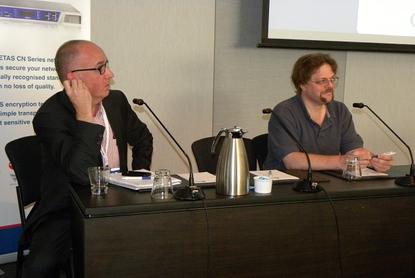Rewards and penalties needed for effective security: Experts
- 06 August, 2012 11:58

Lockstep managing director, Stephen Wilson, and Tenable Network Security CSO, Marcus Ranum.
Security messages and policies won’t work unless IT executives back these messages up with positive reinforcement such as a reward, according to two security experts.
Speaking at the recent Cyber Security Summit in Sydney, Tenable Network Security chief security officer, Marcus Ranum, and Lockstep managing director, Stephen Wilson, provided delegates with some tips for getting security messages front of mind for users and management.
Read: A good security offence is the best defence
Speak the board’s language
According to Ranum, some business people he has spoken to say they don’t have time for security.
To overcome this, he suggested asking executives the following questions:
“When you built your network did you worry about single points of reliability and failure? Did you worry about system reliability?” he said.
“If you ,as a security professional, can get the executives to acknowledge that at any point in the design of the security system that they were concerned about reliability, than tell them that security is another aspect of reliability.”
For example, Ranum suggested that executives see the design of their security system as a business continuity issue.
“The systems should be designed so they are not going to fall apart the first time some Romanian hacker pokes at the system,” he said.
According to Ranum, this type of approach usually gets through to executives because they have budgeted and spent the time to build the system to avoid single points of failure.
Rewards
The two panellists agreed that employees should be rewarded for following the right security practices.
Ranum shared an example at his company where lab researchers have to investigate dangerous pieces of code such as the Stuxnet worm.
“We didn’t want them to be accessing the corporate email network from that environment,” he said.
To combat this problem, the researchers were given iPad tablets which meant the company could improve its security by giving the researchers something that had no administrative cost. In addition, the researchers could play popular games such as Angry Birds during designated breaks.
Ranum added that security professionals should not treat users and customers as if they were children.
“We need to make people understand that the computer is part of their mission and if they want to accomplish their mission, such as getting more money or a promotion, this is the way to do it,” he said.
Effective punishment
“If it is clear that someone has done the [security] equivalent of driving a truck into a ditch, I’m all in favour of firing them,” Lockstep’s Wilson said.
“In the modern world people need to understand that their computer is what they use to get their job done and if you don’t handle it, you get punished.”
Ranum agreed that CSOs needed to take the hard-line approach and fire people who did not follow policy. This way, employees would be clear on what happened if they violated the rules.
He gave the example of an employee at his company who used a wireless router at work. Unfortunately that also meant the person was broadcasting an unsecured service set identifier (SSID) so the person's contract was terminated.
Follow @CSO_Australia and sign up to the CSO Australia newsletter.

